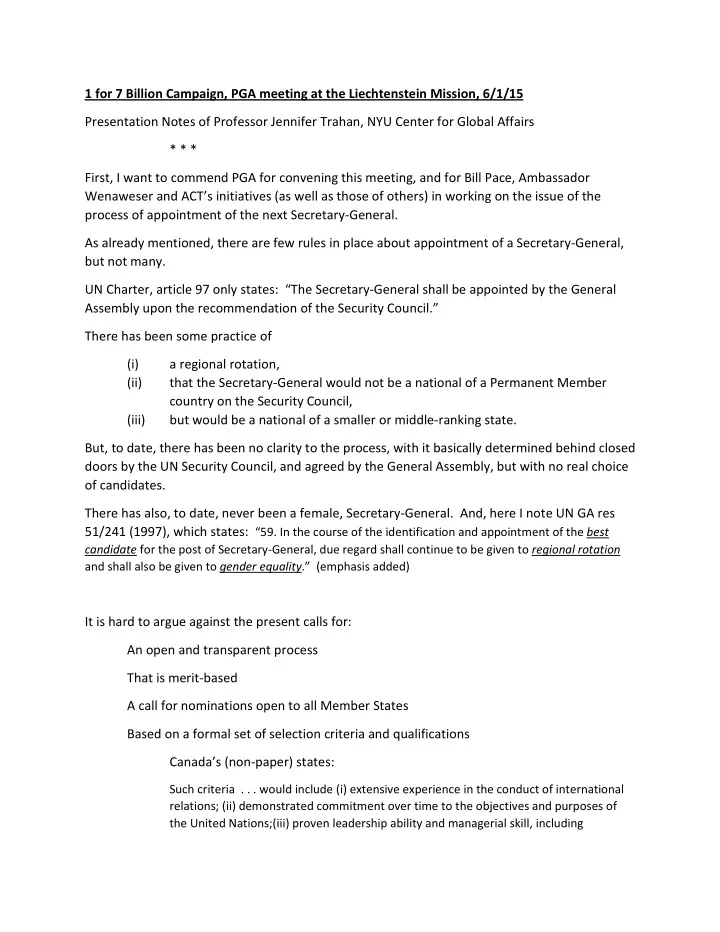

1 for 7 Billion Campaign, PGA meeting at the Liechtenstein Mission, 6/1/15 Presentation Notes of Professor Jennifer Trahan, NYU Center for Global Affairs * * * First, I want to commend PGA for convening this meeting, and for Bill Pace, Ambassador Wenaweser and ACT’s initiatives (as well as those of others) in working on the issue of the process of appointment of the next Secretary-General. As already mentioned, there are few rules in place about appointment of a Secretary-General, but not many. UN Charter, article 97 only states: “The Secretary-General shall be appointed by the General Assembly upon the recommendation of the Security Council.” There has been some practice of (i) a regional rotation, (ii) that the Secretary-General would not be a national of a Permanent Member country on the Security Council, (iii) but would be a national of a smaller or middle-ranking state. But, to date, there has been no clarity to the process, with it basically determined behind closed doors by the UN Security Council, and agreed by the General Assembly, but with no real choice of candidates. There has also, to date, never been a female, Secretary-General. And, here I note UN GA res 51/241 (1997), which states: “59. In the course of the identification and appointment of the best candidate for the post of Secretary-General, due regard shall continue to be given to regional rotation and shall also be given to gender equality .” (emphasis added) It is hard to argue against the present calls for: An open and transparent process That is merit-based A call for nominations open to all Member States Based on a formal set of selection criteria and qualifications Canada’s (non-paper) states: Such criteria . . . would include (i) extensive experience in the conduct of international relations; (ii) demonstrated commitment over time to the objectives and purposes of the United Nations;(iii) proven leadership ability and managerial skill, including
experience of modern management methods and a commitment to transparency and ethics; and (iv) strong communications skills. That multiple qualified candidates be put forward That candidates present their CVs and make their cases in a Statement of their vision for the UN and their leadership goals With a clear time-table, that allows sufficient consideration. And, hopefully, the General Assembly would then have a choice at the end of the process. This of course does not supplant the role of the UN Security-Council, as mandated under the Charter. The goal is obviously to select the best possible, qualified candidate. Also, I would add that maybe: there also needs to be a commitment by all of the candidates that they are not making promises of any kind in return for the support of any country And, a corollary commitment that States will not seek anything from any Secretary- General candidate, if elected, in return for support of the candidate. Article 100(1) of the Charter provides “In the performance of their duties the Secretary-General and the staff shall not seek or receive instruction from any government or from any other authority external to the Organization. They shall refrain from any action which might reflection on their positon as international officials responsible only to the Organization.” Similarly, 100(2) puts a similar duty on UN Member states: “Each Member of the UN undertake to respect the exclusively international character of the responsibilities of the Secretary-General and the staff and not to seek to influence them in the discharge of their responsibilities.” One does not want a Secretary-General candidate to make promises that would make him or her beholden once in office, or for UN Member states, during the selection process, to seek influence over the person who could become Secretary-General. Yes, the process envisioned may turn into somewhat of a campaign—and, yes, that is somewhat unseemly—but it presently does occur, but mainly behind closed doors.
The Secretary General’s post, as already allude to, is of obvious of key global significance. Under UN Charter Article 97, he (or she) is the “chief administrative officer” of the UN. The Secretary-General has a unique role in galvanizing momentum on critical global challenges, as important and diverse as: o Preventing atrocity crimes o Climate change / sustainable development o Humanitarian crises o Nuclear disarmament o Millennium development goals o Countering terrorism (within the strictures of human rights obligations) o And under UN Charter article 99, the Secretary-General may bring to the attention of the Security Council any matter which in his [or her] opinion may threaten the maintenance of international peace and security.” Many, many far less important jobs the world over would have a methodical and transparent hiring process, so it is quite remarkable that there isn’t one here. I do think the limitation would be that one has to adhere to the ambit of the Charter. I don’t mean there aren’t issues where we’d like to see Charter reform, but it is obviously very difficult, so I don’t think that it is being suggested here. I’ll leave it there, and look forward to discussion. Thank you.
Recommend
More recommend